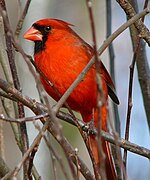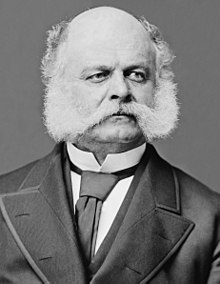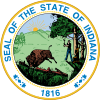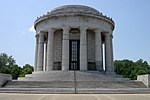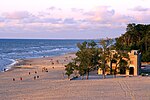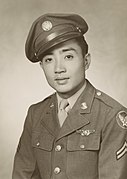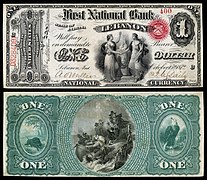The Indiana Portal
Various indigenous peoples inhabited what would become Indiana for thousands of years, some of whom the U.S. government expelled between 1800 and 1836. Indiana received its name because the state was largely possessed by native tribes even after it was granted statehood. Since then, settlement patterns in Indiana have reflected regional cultural segmentation present in the Eastern United States; the state's northernmost tier was settled primarily by people from New England and New York, Central Indiana by migrants from the Mid-Atlantic states and adjacent Ohio, and Southern Indiana by settlers from the Upland South, particularly Kentucky and Tennessee.
Indiana has a diverse economy with a gross state product of $352.62 billion in 2021. It has several metropolitan areas with populations greater than 100,000 and a number of smaller cities and towns. Indiana is home to professional sports teams, including the NFL's Indianapolis Colts and the NBA's Indiana Pacers. The state also hosts several notable competitive events, such as the Indianapolis 500, held at Indianapolis Motor Speedway. (Full article...)
Selected article -
The Reno Gang, also known as the Reno Brothers Gang and The Jackson Thieves, were a group of criminals that operated in the Midwestern United States during and just after the American Civil War. Though short-lived, the gang carried out the first three peacetime train robberies in U.S. history. Most of the stolen money was never recovered.
The gang was broken up by the lynchings of ten of its members by vigilante mobs in 1868. The murders led to an international diplomatic incident with Canada and Great Britain, international newspaper coverage, and a general public uproar, though no one was ever identified or prosecuted for the lynchings. (Full article...)Selected image -
Did you know -
- ... that the 2020 case Henderson v. Box held that the state of Indiana must list same-sex parents on their child's birth certificate?
- ... that the Leedy Manufacturing Company of Indianapolis, Indiana, was at one point the largest manufacturer of drums in the world?
- ... that the Indianapolis Community Food Access Coalition was created to resolve food deserts in the city of Indianapolis?
- ... that three years prior to this month's massive plastics fire in Indiana, a court determined that the site was a fire hazard "unsafe to people and property"?
- ... that after the Wolverines released their "Moose" for his fifth season, he went on to win another Big Ten championship with the Hoosiers?
- ... that LGBT rights activist Kit Malone helped create the first transgender organized marching group in the Indianapolis Pride Parade's history?
Related portals
Selected geographic article -

Muncie (/ˈmʌnsi/ MUN-see) is an incorporated city and the seat of Delaware County, Indiana, United States. Previously known as Buckongahelas Town, named after the prominent Delaware Chief, it is located in East Central Indiana, about 50 miles (80 km) northeast of Indianapolis. At the 2020 United States Census, the city's population was 65,195, down from 70,085 in the 2010 Census. It is the principal city of the Muncie Metropolitan Statistical Area, which encompasses all of Delaware County. The city is also included in the Indianapolis–Carmel–Muncie, IN Combined Statistical Area.
The Lenape (Delaware) people, led by Buckongahelas arrived in the area in the 1790s, founding several villages, including one known as Munsee Town, along the White River. The trading post, renamed Muncietown, was selected as the Delaware County seat and platted in 1827. Its name was officially shortened to Muncie in 1845 and incorporated as a city in 1865. Muncie developed as a manufacturing and industrial center, especially after the Indiana gas boom of the 1880s. It is home to Ball State University. As a result of the Middletown studies, sociological research that was first conducted in the 1920s, Muncie is said to be one of the most studied United States cities of its size. (Full article...)Selected biography -
Ambrose Everett Burnside (May 23, 1824 – September 13, 1881) was an American army officer and politician who became a senior Union general in the Civil War and three-time Governor of Rhode Island, as well as being a successful inventor and industrialist.
He was responsible for some of the earliest victories in the Eastern theater, but was then promoted above his abilities, and is mainly remembered for two disastrous defeats, at Fredericksburg and the Battle of the Crater (Petersburg). Although an inquiry cleared him of blame in the latter case, he never regained credibility as an army commander. (Full article...)Selected quote
General images
Topics
- Economy: AM General - ATA Airlines - Casinos - Cummins - Delta - ITT - JayC - Lilly - Limestone - Manufacturing - NiSource - Shoe Carnival - Simon Property Group - Soybeans - Studebaker - Vectren - WellPoint
- Geography: Caves - Lakes - Rivers - State forests - Watersheds
Categories
Attractions
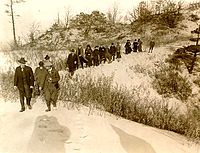 |
Recognized content
Good articles
- 1963 Indiana State Fairgrounds Coliseum gas explosion
- 2006 Brickyard 400
- 2011 South Bend mayoral election
- 2015 South Bend mayoral election
- 2019 South Bend mayoral election
- 2021 NCAA Division I men's basketball championship game
- Max Bielfeldt
- The Fault in Our Stars (film)
- Hurley Goodall
- Proposed South Shore Line station in South Bend
- WCAE
Featured pictures
-
Kenje Ogata 1943
-
Kurt Vonnegut by Bernard Gotfryd (1965)
-
US-NBN-IL-Lebanon-2057-Orig-1-400-C
WikiProjects
Things you can do
 |
Here are some tasks awaiting attention:
|
Associated Wikimedia
The following Wikimedia Foundation sister projects provide more on this subject:
-
 Commons
Commons
Free media repository -
 Wikibooks
Wikibooks
Free textbooks and manuals -
 Wikidata
Wikidata
Free knowledge base -
 Wikinews
Wikinews
Free-content news -
 Wikiquote
Wikiquote
Collection of quotations -
 Wikisource
Wikisource
Free-content library -
 Wikiversity
Wikiversity
Free learning tools -
 Wikivoyage
Wikivoyage
Free travel guide -
 Wiktionary
Wiktionary
Dictionary and thesaurus
- ^ a b "Elevations and Distances in the United States". U.S Geological Survey. 29 April 2005. Retrieved 2006-11-06.


